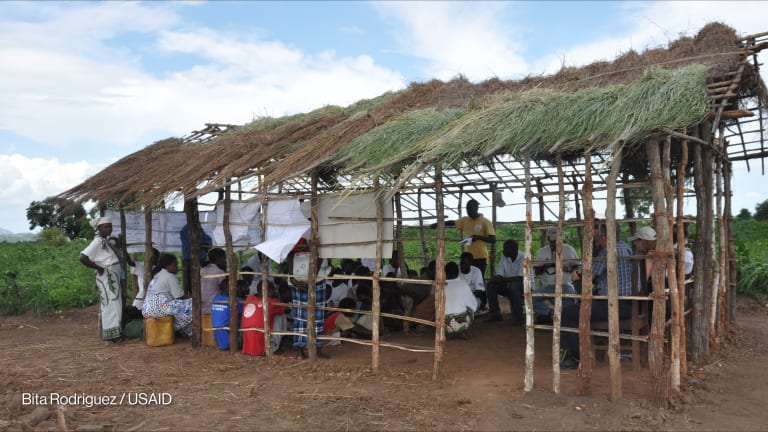
WASHINGTON — Jim Barnhart returned to Washington from his post in Jordan to head the U.S. Agency for International Development’s Bureau for Resilience and Food Security in the middle of a pandemic that threatens to push hundreds of millions of people into hunger.
The new bureau, created during USAID’s transformation, brings together a host of disciplines previously scattered across the agency — including food security, nutrition, water, resilience, and sanitation and hygiene — under the same roof to improve efficiency and promote multisectoral collaboration.
Barnhart, who served as deputy assistant administrator in the old Bureau for Food Security before he went to the Middle East, also now heads Feed the Future as the global hunger initiative turns 10.
“I came back into the role now heading the bureau with a certain set of expectations that I was well versed in the way the bureau was operating,” Barnhart said. “But the transformation that we underwent in adding water, elevating resilience, and nutrition to the bureau has really been something that I’ve had to get up to speed on very quickly because that’s new, and it’s exciting.”
Barnhart recently spoke with Devex about how RFS is harnessing flexibility to meet both short- and long-term food security and nutrition challenges caused by the coronavirus pandemic.
This conversation has been edited for length and clarity.
How does the composition of RFS position it to take on food security challenges posed by COVID-19?
Climate, conflict at core of changes to USAID resilience work
Although USAID's work on resilience was "still a work in progress," it is already showing clear results, an agency official said.
When I was heading the mission in Jordan, we were trying to figure out in real time a global event that was taking place more or less simultaneously across the globe in March. So all of us were scrambling to try to figure out how we could best support our countries using our assistance, our human and technical expertise to help them weather this storm.
One of the things that I’ve been truly impressed by when I arrived back here is how Feed the Future and RFS specifically has been able to work with our implementing partners — particularly our international NGOs but also our academic institutions and private sector partners — to be very nimble in the field to be able to address, in real time on the ground, situations with partners in ways that we hadn’t thought through.
One of the things I’ve noticed since sitting in this chair is that there is not as strong a correlation between infection rates and food insecurity and malnutrition. In many of the countries where we have seen high COVID infection rates, we have seen this. But it’s also affecting countries that don’t necessarily stand out as having high rates. And that’s because this pandemic has affected movements of individuals, movements of communities, movements of products.
So what we’re having to do is disentangle this issue and be able to talk to our partners trying to get to how are these systems going to be able to function in this pandemic.
What’s an example of this?
In Uganda, one of the things we were working on with smallholder farmers and SMEs [small and medium-sized enterprises] was switching programming so they could then use social media to advertise their products. They could use the internet or smartphones to pivot their business strategy. So rather than, for instance, selling only to supermarkets, these folks are now beginning to sell directly to individual consumers, and they’re leveraging social media and these other online platforms to promote their products.
We have to do that across the board. What I’ve been really impressed by is how our folks in the field — our missions, our implementing partners — have been able to adjust very flexibly and nimbly to a crisis that all of us are trying to address as it unfolds, without any sense of how long it will last.
“We cannot wait. The urgency is that we have to act now, working side by side with our humanitarian partners to start thinking about the long term.”
— Jim Barnhart, assistant administrator, USAID Bureau for Resilience and Food SecurityWill the flexibility of programs that were already in progress be the key to success?
We’re still in the midst of dealing with this as we speak. But already an applied lesson learned is: As we roll out new programming, even in a post-COVID world, we need to be able to continue to put in place programming that allows our experts in the field to be able to adjust, to be able to pivot as needed.
This is so obvious when you think about it. Of course somebody who is in Ethiopia and is working with smallholders, they face a crisis. Of course those people have the best sense of what works both within that particular geography but also within that culture and the political context.
There’s a whole variety of things that come into play. All too often, it’s far easier to try to figure out how to manage things centrally from headquarters. And there are moments where that has to happen, where you need to direct resources immediately to a humanitarian crisis. But as the Resilience and Food Security and the Feed the Future folks, we think about the medium to long term.
We have to figure out how we address the systems, and that requires a lot of on-the-ground, field-centric, delegated authorities to allow them to adjust. This is one of the things that I have to commit to: to figuring out, moving forward, how we are going to make ourselves as field-centric as possible.
The international food security picture is bleak. How is Feed the Future looking at addressing both immediate and long-term food security impacts of COVID-19?
The projections that we’ve seen from the International Food Policy Research Institute, from the U.N. [United Nations] system — they are daunting, and they are scary. I think they are a call to action for all of us who are committed to eliminating food insecurity, hunger, malnutrition in our lifetimes. So we’ve got to redouble our efforts.
But projections aren’t necessarily destiny. I think what we have to do — and I play this role, and I know that our interagency folks play this role with Feed the Future — is to let people know that we have a model that works, that’s based on partnership and innovation. If we can allow for this flexibility in the field, we can figure out ways to try to mitigate these deleterious projections we see.
How do you do that?
One of the things we’re doing within USAID in our transformation process is bring together our humanitarian folks, our conflict folks, and our resilience and food security folks under one umbrella of families. We call them the “R3 families.” By doing that, we are very consciously trying to make sure that when our humanitarian folks are called to get the World Food Programme, through Food for Peace, to be delivering food to key areas that are either struck by drought, floods, or, in this case, COVID-related food insecurity that’s happening right now.
More on USAID:
► White House pandemic proposal would 'dismember' USAID, says former administrator
► Food security, troops in the spotlight at US Sahel policy hearing
► Q&A: USAID's first chief nutritionist plans to 'demystify' the sector
These people need urgent food to get them through the next weeks and months. So we need to start working right then and there with our friends in the Humanitarian Assistance Bureau to figure out: “Great, you guys have it right now, but we need to start thinking through: Is the problem institutional? Is the problem legal/regulatory, that there’s something going on where people aren’t allowed to import seeds or fertilizer? Is it a problem with the market? Is it that markets are shut down because the sanitation isn’t good enough?”
If that’s the case, then let’s start working with our local partners who we already have programs with to try to address the hygiene issue and the markets and be able to convince local authorities that it’s safe to open the markets or it’s safe to allow farmers to get to their distributors of seed and fertilizer and start the planting process.
But we cannot wait. The urgency is that we have to act now, working side by side with our humanitarian partners to start thinking about the long term. Because if we still think in terms of: “Well, the humanitarian folks are going to do their thing, and then a little bit later the development folks will come in and we’ll figure out the longer-term stuff in our own time” — we can’t do that.
We have to start right now, because if we don’t, then those dire projections that we see do become destiny, they do become reality, and then we have a humanitarian crisis that is far larger than the one we’re currently experiencing, which is already quite large.








